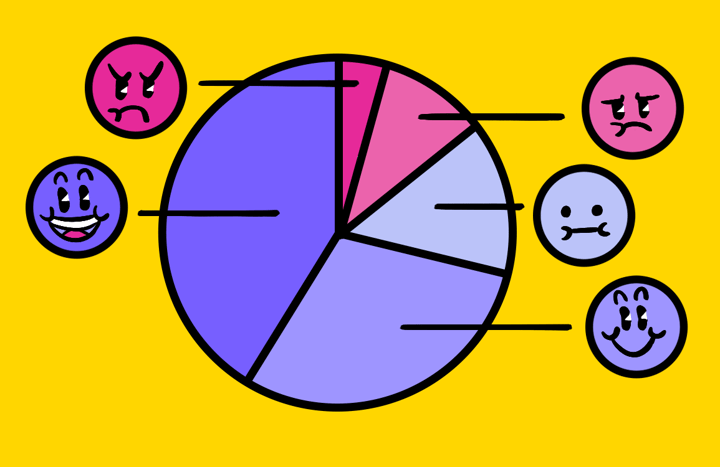The Importance of Qualitative Market Research in Understanding Consumer Behavior
Understanding consumer behavior is critical to marketing success. One crucial tool that helps marketers gain this understanding is qualitative market research. Through in-depth analysis and exploration, qualitative research enables us to delve into consumers’ minds, uncover their motivations, and identify market trends. In this article, we will explore the concept of qualitative market research, its role in marketing, its connection to consumer behavior, its benefits, and its challenges.
🔩 The Nuts and Bolts:
- Captures Complex Consumer Motivations: Qualitative market research digs more deeply than mere statistics to reveal the emotions, attitudes, and underlying motivations of consumers, providing critical insights for nuanced marketing strategies.
- Drives Product Innovation: By tapping into detailed consumer feedback, companies can innovate and tailor products to meet the specific needs and preferences uncovered through qualitative research methods like focus groups and interviews.
- Identifies Emerging Trends: This research method is instrumental in spotting early signs of shifting consumer preferences and emerging trends, allowing companies to adapt quickly to market changes.
- Strengthens Brand Messaging: Qualitative insights help companies craft compelling and resonant brand messages that connect with their target audience on a more personal level, enhancing brand loyalty and consumer engagement.
- Enhances Customer Experience: Through direct interactions and detailed feedback, companies can pinpoint areas of improvement in the customer journey, leading to improved overall customer satisfaction and retention.
- Guides Strategic Decision Making: The rich, detailed data obtained from qualitative research informs strategic decisions, from product development to market entry strategies, ensuring they are based on actual consumer needs and expectations.
- Challenges and Solutions in Data Interpretation: While the subjective nature of qualitative data presents challenges, adopting rigorous methodologies and involving multiple analysts can help mitigate bias and enhance the reliability of interpretations.
Understanding the Concept of Qualitative Market Research
Before we explore the topic further, let’s define qualitative market research. Unlike its quantitative counterpart, qualitative research focuses on gathering non-numerical data, such as opinions, values, and attitudes. It aims to uncover the “why” behind consumer behavior, providing valuable insights into decision-making processes.
Qualitative market research involves focus groups, interviews, and observation. It emphasizes open-ended questions and encourages participants to freely share their thoughts and experiences. Marketers can gain rich and detailed insights that help shape their strategies by analyzing these qualitative data points.
When conducting qualitative research, several critical components should be considered. First, selecting the appropriate sample group ensures diversity and representativeness. This ensures that the insights gathered apply to a broader population and are not limited to a specific demographic. For example, if a company is researching a new skincare product, it would be essential to include participants of different ages, genders, and skin types to gather a comprehensive understanding of consumer preferences.
Second, creating a comfortable and open environment for participants is essential in qualitative research. This makes participants feel at ease and encourages them to provide honest and valuable feedback. The researcher should establish rapport with the participants, making them feel heard and respected. This can be achieved through active listening, maintaining eye contact, and showing genuine interest in their responses.
Lastly, the analysis process should be thorough and objective. Qualitative data analysis involves organizing, categorizing, and interpreting the collected data. This can be done through techniques such as coding, where themes and patterns are identified, and connections between different responses are established. Researchers must approach the analysis process without bias, allowing the data to speak for itself and uncover insights that may not have been initially anticipated.
In conclusion, qualitative market research is valuable for understanding consumer behavior. Marketers can gather non-numerical data that provides insights into the “why” behind consumer decision-making by utilizing techniques such as focus groups, interviews, and observation. Researchers can gain rich and detailed insights that inform their marketing strategies by considering key components such as sample group selection, creating a comfortable environment, and conducting a thorough analysis.
Make your design decisions count.
Subscribe to Design Under Pressure. Get insights, UX metrics, and tools for bold, informed design.
We respect your inbox. Just insights. No fluff. Privacy Policy.
The Role of Qualitative Research in Marketing
Now that we understand qualitative research let’s explore its role in marketing. One of the primary benefits of qualitative research is its ability to uncover consumer motivations.
Quantitative research can only provide us with numbers and statistics when understanding consumer behavior. However, qualitative research goes beyond the numbers and delves into the why behind consumer actions. Through methods like focus groups and interviews, qualitative research enables marketers to understand better what drives consumer behavior.
By engaging directly with consumers and listening to their stories, marketers can uncover the emotions, desires, and needs that influence their purchasing decisions. This valuable insight allows us to tailor marketing messages that resonate with our target audience on a personal level.
Uncovering Consumer Motivations
Through methods like focus groups and interviews, qualitative research enables marketers to better understand what drives consumer behavior. By exploring their emotions, desires, and needs, we can tailor marketing messages that resonate with our target audience on a personal level.
For example, a company wants to launch a new line of eco-friendly cleaning products. Through qualitative research, they can conduct focus groups to understand why consumers choose eco-friendly products. They may uncover motivations such as a desire to protect the environment, concerns about health and safety, or a sense of social responsibility. Armed with this knowledge, the company can develop marketing campaigns that highlight these motivations and connect with consumers on a deeper level.
Identifying Market Trends
In addition to uncovering motivations, qualitative research helps identify emerging market trends. Marketers can spot patterns and make informed predictions about future market developments by closely observing consumer behavior and listening to their opinions.
For instance, let’s consider a fashion brand that wants to stay ahead of the curve and anticipate the next big trend. Through qualitative research, they can conduct interviews and gather feedback from fashion-forward individuals. By listening to their opinions, observing their style choices, and understanding their preferences, the brand can identify emerging trends before they become mainstream.
This foresight gives businesses a competitive edge and the ability to adapt their strategies accordingly. By being proactive and staying attuned to consumer preferences, companies can position themselves as trendsetters and capture the attention of their target audience.
The Connection Between Qualitative Research and Consumer Behavior
Qualitative research and consumer behavior are intricately connected. By understanding how qualitative research influences consumer perception, we can leverage its insights to shape our brand’s image in consumers’ minds.
Qualitative research goes beyond gathering quantitative data. It enables marketers to gather data from consumers themselves, providing a deeper understanding of their perceptions and opinions about a brand. This type of research allows businesses to delve into consumers’ minds, uncovering the underlying motivations and emotions that drive their behavior.
By using the insights gained from qualitative research, businesses can shape their brand identity and messaging to align with consumer expectations. This alignment is crucial in building a strong and positive brand reputation. When consumers feel that a brand understands them and their needs, they are more likely to develop a sense of loyalty and trust.
How Qualitative Research Influences Consumer Perception
Qualitative research plays a vital role in influencing consumer perception. It allows marketers to understand how consumers perceive a brand, its products, and its messaging.
Through qualitative research methods such as focus groups, in-depth interviews, and observational studies, marketers can explore consumers’ thoughts, opinions, and experiences. This information provides valuable insights into how consumers interpret and make sense of a brand’s offerings.
For example, qualitative research can uncover how consumers perceive a product’s quality, value, and uniqueness. It can also reveal how consumers associate a brand with certain emotions or values. With this knowledge, marketers can tailor their brand positioning and messaging to resonate with consumers on a deeper level.
The Impact of Qualitative Research on Consumer Decision Making
Consumer decision-making is a complex process influenced by a multitude of factors. Qualitative research plays a significant role in this process by providing insights into consumers’ thoughts, experiences, and preferences.
By understanding consumers’ underlying motivations and needs, marketers can design products and campaigns that speak directly to them. This targeted approach increases the likelihood of purchase and fosters brand loyalty.
For instance, qualitative research can reveal consumers’ specific pain points and desires in a particular market segment. With this knowledge, marketers can develop products that address these needs and create marketing campaigns highlighting how their offerings provide solutions.
Furthermore, qualitative research can illuminate the decision-making process itself. It can uncover the factors influencing consumers’ choices, such as social influences, personal values, and emotional triggers. This understanding allows marketers to craft persuasive messaging and create experiences that resonate with consumers, ultimately influencing their decision-making process.
In conclusion, qualitative research and consumer behavior are closely intertwined. By delving into the minds of consumers and understanding their perceptions, needs, and decision-making processes, businesses can shape their brand image and offerings to better align with consumer expectations. The insights from qualitative research provide a powerful tool for marketers to enhance their brand reputation, increase customer loyalty, and drive business success.
🚀 If you’re using Helio
Leverage insights to shape your brand’s image in consumers’ minds.

Qualitative research and consumer behavior are closely intertwined.
The Benefits of Using Qualitative Market Research
Implementing qualitative market research provides several significant benefits for businesses aiming to understand consumer behavior.
Gaining Deep Insights into Consumer Preferences
Unlike quantitative research, qualitative research allows businesses to gain in-depth insights into consumer preferences. It helps us move beyond surface-level data and uncover hidden nuances that can drive strategic decision-making. This level of understanding gives businesses a competitive advantage in meeting consumer needs.
Enhancing Brand Strategy through Qualitative Research
Qualitative research plays a vital role in shaping brand strategy. Businesses can refine their brand messaging, product features, and marketing campaigns by gathering consumer feedback. This intimate knowledge of consumer preferences allows businesses to create stronger connections with their target audience and drive brand loyalty.
Challenges in Conducting Qualitative Market Research
While qualitative market research provides many benefits, it also presents challenges that researchers must overcome to obtain accurate and meaningful results.
Overcoming Subjectivity in Data Interpretation
One potential challenge in qualitative research is the subjective nature of data interpretation. Researchers must carefully navigate the influence of their own biases and preconceptions to ensure objective analysis. Adopting rigorous methodologies and involving multiple researchers can help mitigate this challenge.
Ensuring Validity and Reliability in Qualitative Research
Another challenge is ensuring the validity and reliability of qualitative research findings. Unlike quantitative research, qualitative research relies heavily on interpretation and context. Researchers must establish credibility by adhering to rigorous methodologies, using different data collection techniques, and seeking multiple perspectives.
In conclusion, qualitative market research is crucial in understanding consumer behavior. By delving deep into consumers’ minds, it uncovers motivations, identifies trends, and shapes brand strategies. While challenges exist, the benefits of qualitative research far outweigh them. Embracing qualitative research empowers businesses to connect with consumers more profoundly, leading to more effective marketing strategies and, ultimately, business success.
Qualitative Market Research FAQs
Qualitative market research involves collecting non-numerical data to understand consumer behaviors, motivations, and attitudes. It’s crucial because it provides depth and context that help businesses understand the “why” behind consumer actions, enhancing product development and marketing strategies.
Businesses use qualitative research to gather detailed feedback on product usage, preferences, and satisfaction levels. This information guides product modifications and innovations to better meet consumer needs and expectations.
Standard methods include in-depth interviews, focus groups, ethnographic studies, and observational research. Each technique allows researchers to explore different aspects of consumer behavior in various environments.
Challenges include the potential for subjective data interpretation, the difficulty of ensuring the validity and reliability of the results, and the time-consuming nature of data collection and analysis. Employing diverse methods and multiple researchers can help address these issues.
By providing a deep understanding of consumer motivations and behaviors, qualitative research helps businesses develop targeted marketing strategies that effectively communicate the value of their products and resonate with their audience.
Technology plays a crucial role by facilitating the collection and analysis of data through digital tools like online focus groups and mobile ethnography. It also allows for storing and systematically analyzing large volumes of qualitative data.
Companies can effectively use qualitative market research by clearly defining research objectives, choosing appropriate methodologies, meticulously planning data collection, ensuring thorough and unbiased data analysis, and regularly updating research techniques to adapt to new market conditions.



